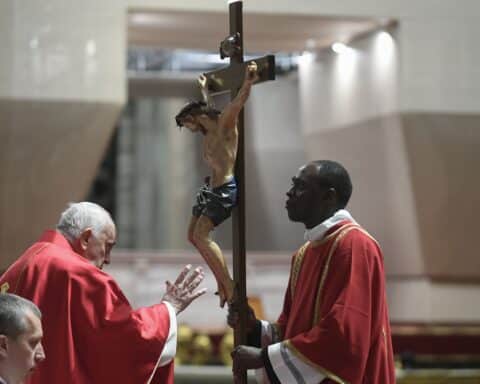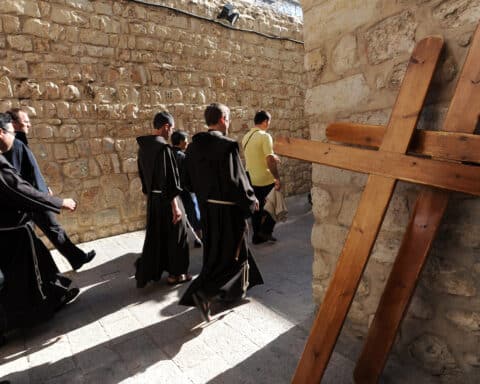Every year, for over 40 years now, I have given up watching TV for Lent. I know it’s no longer fashionable to give something up for Lent; instead, we are urged to “do something positive,” something that will make a difference in our spiritual life or (preferably, it seems) in the corporal life of others. From the first time I heard that argument, it struck me as a false dichotomy: How am I to have more time to pray, or more time to volunteer to help others, unless I first give up something to which I am overly attached? To be, as Christ told us we should be, in this world but not of it, we must deny ourselves, take up our cross and follow him.
This year, in place of watching TV, I will spend a portion of my time meditating on “The Sunday Sermons of the Great Fathers,” a four-volume set of commentary on the Gospel readings for each Sunday in the traditional lectionary of the Church. As I mentioned a few weeks ago, reading the exegesis of the Fathers of the Church is valuable because it puts us in a very different mindset from that of the modern world. To see how they interpreted Scripture is to realize, among other things, that the transformation Christ wrought in this world is the result of sacrifice, and not simply — as we modern men and women too often think — by providing an example for us to follow.
The reason for miracles
Even the miracles that Christ wrought (the Fathers of the Church declare) were not an end in themselves but served the end of preparing the disciples to accept his teaching. Thus, in a sermon for Quinquagesima Sunday (the final Sunday of the traditional pre-Lenten season, the Sunday before Ash Wednesday) St. Gregory the Great notes that the purpose of Christ’s healing of the blind man Bartimaeus on the road to Jericho was that the disciples — “still carnal men” — “would be strengthened in faith through heavenly deeds” because they “could not grasp the words of the heavenly mystery” that he had just revealed to them: that the Son of Man, as Luke says in his Gospel, “shall be delivered to the Gentiles, and shall be mocked, and scourged, and spit upon: and after they have scourged him, they will put him to death; and the third day he shall rise again” (18:32-33).
The healing of Bartimaeus, of lepers, of the paralytic; the multiplication of the loaves and fishes — all of these miracles Christ wrought so that his disciples might understand that the words he spoke were true.
Clearly, the healing of the blind man is a very good thing for Bartimaeus, but the miracle serves, for both Bartimaeus and the disciples, as a sign of the truth of the mystery of our redemption that Christ had revealed to his disciples on the road to Jericho. Thus, when Christ tells Bartimaeus that “thy faith hath made thee whole,” he is urging the disciples to keep their faith even as the events of his Passion begin to unfold. Alas, even restoration of sight to the blind — a sign of the spiritual enlightenment that our participation in the mystery of Christ’s death and resurrection brings us — was not enough to keep his disciples by his side from his arrest on the evening of Holy Thursday through his crucifixion and death on Good Friday. In the moment, they chose personal safety rather than sacrifice.
Uniting with the mystery
The healing of Bartimaeus, of lepers, of the paralytic; the multiplication of the loaves and fishes — all of these miracles Christ wrought so that his disciples might understand that the words he spoke were true. “Which is easier, to say, ‘Your sins are forgiven,’ or to say, ‘Rise and walk’?
But that you may know that the Son of Man has authority on earth to forgive sins’ — he then said to the paralytic, ‘Rise, pick up your stretcher, and go home” (Mt 9:5-6).
All the signs, in other words, that Christ wrought were meant to draw his disciples (and us) further into the mystery of his sacrifice. We participate most fully in that mystery when we receive the Body and Blood of Christ at Mass. But we can unite ourselves to it in little ways every day, through our small sacrifices — even when we give up chocolate or soda or watching TV during Lent.





